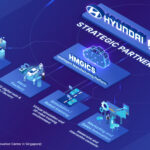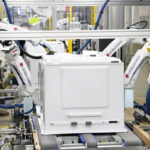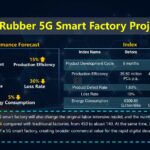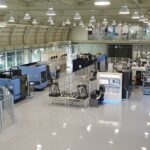ASIA ELECTRONICS INDUSTRYYOUR WINDOW TO SMART MANUFACTURING
LG U+ Bets on Smart Factory Market for Future Growth
LG U+ sets its sight on smart factory market, realigning its 5G-based U+ smart factory solution into 12 specific applications to help factories in Korea to pursue their respective DX, or digital transformation initiative.
The country’s third largest mobile service carrier aims to grab half of the Korean smart factory market, rallying companies in Korea behind its solution to digitalize their factory operation
Lg has built 12 smart factory solutions around its 5G mobile communications network, including motor diagnosis, switchboard diagnosis, equipment predictive maintenance, safety monitoring, environment monitoring, and AI vision inspection, just to name 6.
For example, LG U+ motor diagnosis solution allows factory owners to analyze the current and voltage of a motor and then alert them of possible failures.
Built with a 5G network, a hub of sensors, and Big Data Analytics, the solution can detect and analyze abnormal operations of any motor in real time by referencing its voltage and current status to LG’s 13 million big data on motors and then inform that something will go wrong 3 month to 6 months later.
As a result, factory owners or operators can vent process interruption and damages caused by motor failures or abnormalities and check motor status anytime and anywhere.
Smart Park – Smart Home Appliance Factory System
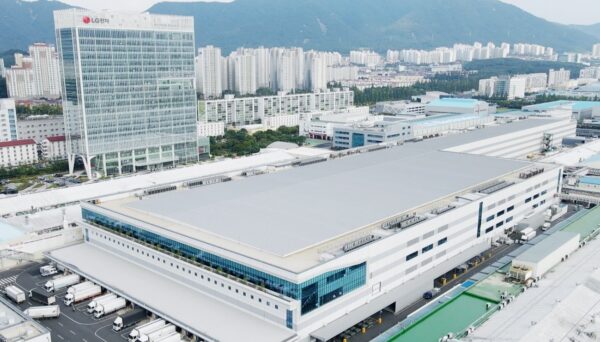
A case in point is LG Chem, which has deployed the solution in its secondary battery manufacturing facilities. The solution is now detecting and analyzing when motors across its cooling process lines will go wrong in advance, allowing cooling process line workers to monitor, detect and prevent in advance the possible motor abnormalities.
The motors have been used to power cooling pumps that are designed to cool down the chemical reaction processes which is very susceptible to overheating. If the motors go wrong, the cooling pump stops, resulting in stoppages of all manufacturing lines and huge losses.
LG Chem is using LG U+’s environment monitoring solution to monitor air pollutants and their proliferation status in real-time. Coming built with a 5G communications technology and a wide array of sensors, the solution can measure air quality, air pollution intensity, and odor, and then provide real-time environmental information and notifications across PCs, mobile phones and tablets. Especially, the solution can detect odors of hydrogen sulfide (H2S), ammonia (NH3), and volatile organic compound (VMSs) in the air in real time and alert of their proliferation.
LG Smart Park in the city of Changwon, Gyeongsannam-do province, Korea, is another showcase of how LG U+ has been implementing its solution to digitalize the traditional home appliance factory in what’s called a digital transformation.
5G-based AGVs move around
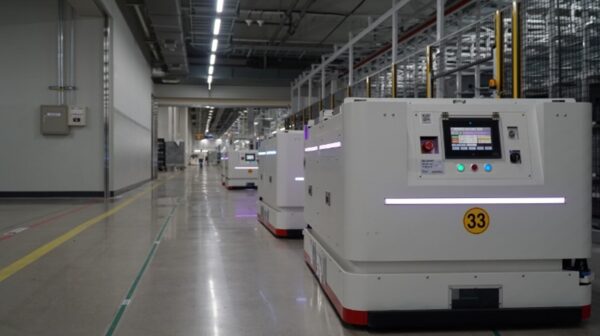
At the Smart Park, LG U+’s 5G network-based logistics robots called Automated Guided Vehicles or AGV are moving around factory assembly line floors to carry back and forth raw materials and parts and components to assemble kitchenware.
The digital transformation doesn’t stop there. With the help of sensors, Big Data Analytics, AI and 5G, all the manufacturing processes from assembly to inspection to packaging have been digitalized to save costs, head counts, and energy.
LG Electronics has invested US$668 million won to integrate all three production lines for refrigerators, ultra-premium and water purifiers in one roof called as Intelligent autonomous factory system.
LG will go further to build one more smart and intelligent manufacturing building to accommodate another 3 production lines.
The Smart Park will be a role model of how LG’s factories of tomorrow will be built and operated in what’s called the DX initiative.
LG U+ will be at the center of LG’s digital transformation initiative.
True enough, LG U+ has been working with about 150 companies to help them to deploy its smart factory solutions, including power houses, petrochemical and heavy machinery industries, and LG Group’s affiliates.
LG expects the country’s smart factory market to stay in the neighborhood of 100 billion won to 200 billion won

